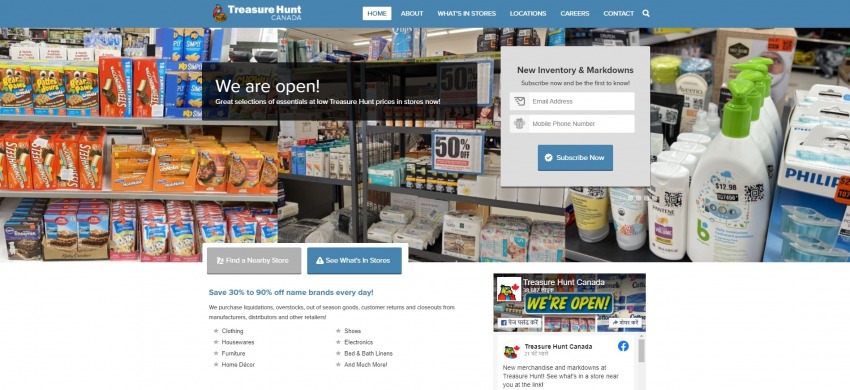

The notices are required by federal law when mass layoffs are planned. Bankruptcy Court in Delaware, said it hopes to find investors or buyers who will keep the company alive.Įmployees received notices that they could lose their jobs within 60 days.

The company, in documents filed last week with the U.S. The company, which has stores in Lodi and Jersey City, has begun going-out-of-business sales at all of its stores, and warned its employees, including 152 workers in Lodi, that they could lose their jobs by Jan. Now its merchandise is being liquidated, and the chain is struggling to find a buyer that will rescue it from bankruptcy. The authoritative record of NPR’s programming is the audio record.Discount retailer National Wholesale Liquidators built its business capitalizing on retail bankruptcies, closeouts and opportunistic buys of unsold merchandise, which it then offered to shoppers at deep discounts. This text may not be in its final form and may be updated or revised in the future. NPR transcripts are created on a rush deadline by an NPR contractor. Visit our website terms of use and permissions pages at for further information. HOROWITZ-GHAZI: Looking around as we check out at the piles of returned goods that might never find a second life, it's hard not to wonder about this system we've created where it's so easy to return things, the costs have basically been swept under the rug - which reminds me, maybe I should buy a robot vacuum.Ĭopyright © 2022 NPR. HOROWITZ-GHAZI: Does it feel like an addiction kind of? SPENCER: But then were like, what if they put it out, you know, something really good and we miss it? You feel like you're going to miss something if you don't go. And Asalyn tells me she dreams about not coming back almost every week. I ask Asalyn and Makayla if they ever get tired living in this constant flow of returned gadgets and price fluctuations. HOROWITZ-GHAZI: They spend about $160 each week and on average, earn about $800, enough for them to pay their tuition at nursing school. HOROWITZ-GHAZI: You're turning your back on your bread and butter? SPENCER: I think we might put the weighted blanket back because they're kind of hard to sell right now. If the price it can sell for is too low, they won't buy it. They even check prices online right before they checkout. Asalyn and Makayla only grab things they can sell for 30 bucks or more. You're not going to get that pet drinking fountain? RIDGEWAY: Did you get knocked down (laughter)? It's like a little retail zombie apocalypse to the tune of "Shape Of Your Body." It's like "Supermarket Sweep" meets "Mad Max." There are bright fluorescent lights, pounding pop music. Inside the store, it's a sensory overload.

HOROWITZ-GHAZI: As the last minutes ticked down before the doors open, it starts to feel like one of those World War I movies, when all the grim-faced soldiers are lined up in the trenches waiting to run into no man's land. And so then we have to move onto a new item and get that. RIDGEWAY: And then the next week, it will feel like everyone has one. Then it was air fryers, then massage guns. They got into this a couple of years ago, Makayla explains, when weighted blankets were all the rage. 2, they tell me, is to zero in on the trendiest consumer items of the moment, things they can buy for the store's flat rate of $10 and sell for much more online.

MAKAYLA RIDGEWAY: Depending on where they go in front of us. And the other will go after, like, the NuWave air fryer over here or the smokeless grill back there. Possibly, one of us going to go after the blender. They then draw up a map and plan out little plays, like a football coach. Asalyn and Makayla use binoculars to spot treasures amidst the piles of returned goods inside. HOROWITZ-GHAZI: Today, a couple of competitors have beat them to the front of the line, so they're going to have to be strategic. Alexi Horowitz-Ghazi, of our Planet Money podcast, followed one such enterprising duo to learn the ropes.ĪLEXI HOROWITZ-GHAZI, BYLINE: When I first meet Asalyn Spencer (ph) and Makayla Ridgeway (ph) outside the Treasure Hunt bin megastore in Raleigh, N.C., they tell me the first lesson of the return reselling business - everyone else is competition.ĭoes everybody, like, rush in at the same time? Or.ĪSALYN SPENCER: Oh, yeah. Many end up at bargain bin stores, where resellers comb through piles of returns in search of items to flip for profit. But lots of those goods don't make it back to their original shelves. Shoppers are returning more of the things they buy than ever before.


 0 kommentar(er)
0 kommentar(er)
